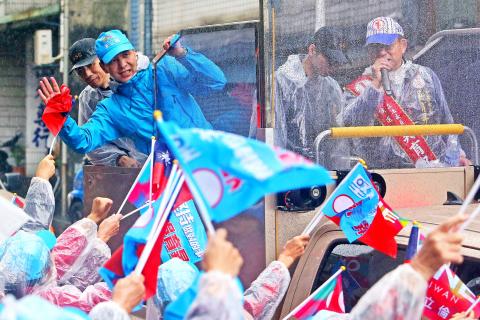Chinese Nationalist Party (KMT) presidential candidate Eric Chu (朱立倫) yesterday braved heavy rain to canvass for votes in Taichung — one of the administrative regions the party considers a decisive battleground in Saturday’s presidential and legislative elections.
Chu, wearing a light-blue jacket and a hat displaying his campaign slogan: “One Taiwan,” arrived in Taichung yesterday morning as scheduled and boarded a vehicle with bulletproof glass.
Chu originally planned to canvass the streets with six of the KMT’s eight candidates who are running for regional legislative seats in the city one-by-one. The six candidates are Yen Kuan-heng (顏寬恒), Shen Chih-hwei (沈智慧), Tsai Chin-lung (蔡錦隆), Lu Shiow-yen (盧秀燕), Yang Chung-ying (楊瓊瓔) and Johnny Chiang (江啟臣).

Photo: AFP
However, Yen was not present due to a scheduling conflict and entrusted his younger sister, Taichung City councilor Yen Li-ming (顏莉敏) of the KMT, to hit the road with Chu on his behalf.
Yen Kuan-heng’s father, former Non-Partisan Solidarity Union legislator Yen Ching-piao (顏清標) — whose family enjoys strong local ties and networks in the city — also came to greet Chu in his son’s stead.
“I have seen that in spite of the heavy rain, many of our supporters are still ardent and enthusiastic... Even though I am soaking wet, wind and rain can bring confidence and I would not let them stop me,” Chu said.
Chu dismissed concerns that Yen Kuan-heng’s absence yesterday is an indication that the KMT leadership is losing its grip on local fractions in Taichung, saying the decision to include Yen Kuan-heng in his street-canvassing schedule was made at the last minute.
“People have read too much into this. Initially, we planned to head directly to the city’s downtown area, but later decided to make another stop [at Yen Kuan-heng’s campaign headquarters],” Chu said.
Asked why Taichung was included in his last-stage campaign schedule and was also the first city he visited after securing the KMT’s nomination as its presidential candidate in October last year, Chu said he regards Taichung as extremely important.
Chu said central Taiwan is undoubtedly a decisive battleground in the upcoming election and the KMT is determined to beat the Democratic Progressive Party (DPP) in the area.
The KMT lost Taichung to the DPP in the 2014 nine-in-one elections, after the city had been governed by former KMT vice chairman Jason Hu (胡志強) for 13 years.
The final stop in Chu’s vehicle procession was the Tzu Chi Temple (慈濟宮) in the city’s Fongyuan District (豐原), where the KMT candidate prayed to the sea goddess Mazu (媽祖) for victory in Saturday’s elections.
Chu traveled back to New Taipei City in the afternoon, where he canvassed in Wugu (五股), Lujhou (蘆洲) and Sanchong (三重) districts.
Meanwhile, Chu’s wife, Kao Wan-chien (高婉倩), visited a traditional market in New Taipei City’s Banciao District (板橋) yesterday morning to solicit support for her husband.
Accompanied by KMT legislative candidate Lin Kuo-chun (林國春) and Lin’s wife, Kao shook hands with vendors and doled out campaign-themed disposable hand warmers to onlookers.

DAREDEVIL: Honnold said it had always been a dream of his to climb Taipei 101, while a Netflix producer said the skyscraper was ‘a real icon of this country’ US climber Alex Honnold yesterday took on Taiwan’s tallest building, becoming the first person to scale Taipei 101 without a rope, harness or safety net. Hundreds of spectators gathered at the base of the 101-story skyscraper to watch Honnold, 40, embark on his daredevil feat, which was also broadcast live on Netflix. Dressed in a red T-shirt and yellow custom-made climbing shoes, Honnold swiftly moved up the southeast face of the glass and steel building. At one point, he stepped onto a platform midway up to wave down at fans and onlookers who were taking photos. People watching from inside

A Vietnamese migrant worker yesterday won NT$12 million (US$379,627) on a Lunar New Year scratch card in Kaohsiung as part of Taiwan Lottery Co’s (台灣彩券) “NT$12 Million Grand Fortune” (1200萬大吉利) game. The man was the first top-prize winner of the new game launched on Jan. 6 to mark the Lunar New Year. Three Vietnamese migrant workers visited a Taiwan Lottery shop on Xinyue Street in Kaohsiung’s Gangshan District (崗山), a store representative said. The player bought multiple tickets and, after winning nothing, held the final lottery ticket in one hand and rubbed the store’s statue of the Maitreya Buddha’s belly with the other,

‘NATO-PLUS’: ‘Our strategic partners in the Indo-Pacific are facing increasing aggression by the Chinese Communist Party,’ US Representative Rob Wittman said The US House of Representatives on Monday released its version of the Consolidated Appropriations Act, which includes US$1.15 billion to support security cooperation with Taiwan. The omnibus act, covering US$1.2 trillion of spending, allocates US$1 billion for the Taiwan Security Cooperation Initiative, as well as US$150 million for the replacement of defense articles and reimbursement of defense services provided to Taiwan. The fund allocations were based on the US National Defense Authorization Act for fiscal 2026 that was passed by the US Congress last month and authorized up to US$1 billion to the US Defense Security Cooperation Agency in support of the

‘COMMITTED TO DETERRENCE’: Washington would stand by its allies, but it can only help as much as countries help themselves, Raymond Greene said The US is committed to deterrence in the first island chain, but it should not bear the burden alone, as “freedom is not free,” American Institute in Taiwan Director Raymond Greene said in a speech at the Institute for National Defense and Security Research’s “Strengthening Resilience: Defense as the Engine of Development” seminar in Taipei yesterday. In the speech, titled “Investing Together and a Secure and Prosperous Future,” Greene highlighted the contributions of US President Donald Trump’s administration to Taiwan’s defense efforts, including the establishment of supply chains for drones and autonomous systems, offers of security assistance and the expansion of